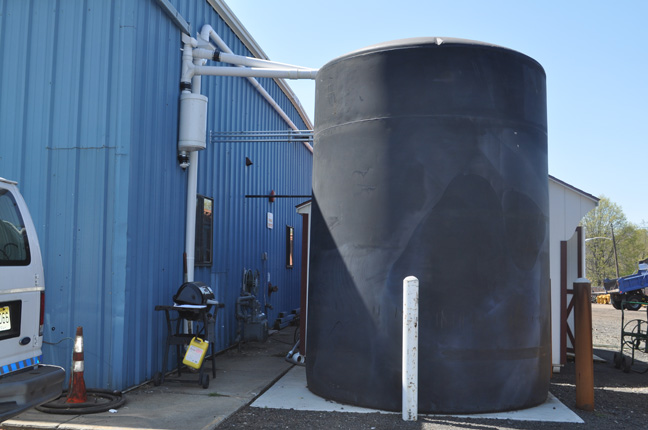Car wash events are a popular fundraising activity for youth clubs in New Jersey and all over the nation. Often the dirty car wash runoff is directed into the storm drain system where it discharges directly to local lakes and streams. A recent study conducted by Rutgers Cooperative Extension (RCE) and published in the Journal of Environmental Engineering showed that car wash runoff from these events has the potential to contribute significant quantities of pollutants to the receiving water bodies. The study also tested a potential solution to this problem: utilizing rain gardens to filter the polluted runoff before it reaches the waterway.
Green Car Wash
Rainwater harvesting involves collecting runoff from an impervious surface and storing it in a container for later use. The container can range in size from a rain barrel, typically 55 or 90 gallons, to a cistern which can hold hundreds or thousands of gallons of water. Pictured here, a 5,000 gallon cistern collects rainwater from the Clark public works building’s roof.
The study was inspired by the Township of Clark’s “green” car wash, which was used for the first time this past May by Cub Scout Pack 145 of Clark to raise money for their scout activities. What makes this car wash “green” is that rainwater from a 5,000 gallon cistern is used to wash the cars. The soapy, dirty water is then filtered by a rain garden which acts like a sponge soaking up pollutants that would otherwise enter the local Robinson’s Branch stream. The research conducted by RCE helped to determine to what extent the rain garden was doing its job. This green car wash was designed by the RCE Water Resources Program and funded by a grant from the New Jersey Department of Environmental Protection.
Nancy Morris, assistant Cub Scout Master said, “We have never done so well! One man came back with 3 cars. People were very pleased to hear that it was an environmentally friendly car wash. The set-up worked great. It is definitely nice to know we are helping the environment in addition to cleaning people’s cars and raising funds for our Cub Scout pack.”
The car washing was mimicked on Rutgers George H. Cook campus in a controlled environment where samples of the dirty wash water could be collected and analyzed for total phosphorus (TP), total suspended solids (TSS), and surfactants, which are synthetic chemicals used in detergents and are toxic to aquatic life. The dirty runoff was also applied to miniature experimental rain gardens built in containers (known as mesocosms) to see how well the rain gardens removed the pollutants of concern. After 24 hours samples were collected from the bottom of the mesocosms and sent to the lab to be compared to the pollutant levels in the dirty wash water.
Results showed that the rain gardens removed between 84 to 95% of the sediment and between 89 to 96% of the surfactants from the wash water. Although surfactant concentrations were significantly reduced, the final levels were not below what has been reported by other studies to be toxic to aquatic life. Surfactants are used around the world for household and industrial cleaning as well as textile manufacturing. Surfactants can damage the gills and mucus membranes of fish as well as impact larval growth and fertilization of many aquatic animals.
An additional research finding was that more phosphorus was coming out of the rain garden mesocosms than going into them. This is not the first study to show that rain gardens may leach phosphorus. In this case, the extra phosphorus may have been from the soil media used during mesocosm construction. The rain garden mesocosms will be monitored long term to determine how long it takes for the phosphorus to be reduced.
This is the first study looking at the effectiveness of using rain gardens to treat car wash pollutants, specifically surfactants. Additional research is underway to further determine how well rain gardens remove pollutants associated with car wash runoff.
Rain gardens are often installed on school grounds to educate students and parents about the importance of watershed protection. Considering the popularity of car wash fundraisers for student activity clubs, an enormous potential exists to marry these two activities. Car wash events could become an education and outreach opportunity not just for students, but also for parents who help organize these activities and drivers who have their cars washed. Through this project, RCE is hoping to educate the public about the potential to use rain gardens to help reduce the negative impacts of car wash runoff.
The study is being conducted by Michele Bakacs, Rutgers Cooperative Extension environmental and resource management agent for Middlesex/Union counties; Steve Yergeau, postdoctoral associate, Department of Environmental Sciences; and Christopher C. Obropta, associate professor of environmental sciences and extension specialist in water resources.
For further information on this project, or to help start a “green” car wash in your town, contact Bakacs at bakacs@njaes.rutgers.edu or call 732-398-5274.


